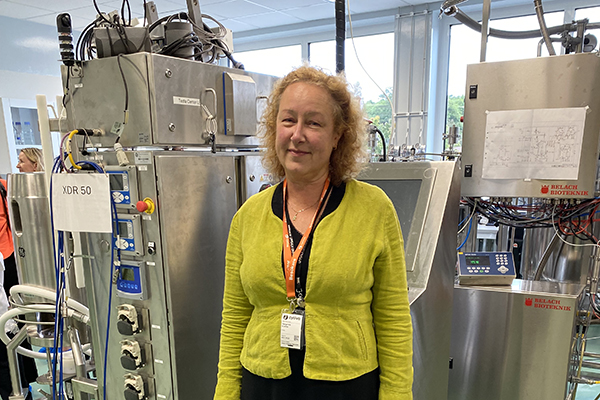“For these five years, Uppsala University has been the only university in Sweden that has had a partnership agreement in place with Testa Center. This agreement has provided an excellent opportunity to develop research and education in the life sciences, but also in technology and IT.”
What specifically has the Testa Center given the University the opportunity to develop?
“In part specific technologies for the industrial-scale production of different types of biomaterials, antibodies and cells, or of proteins that need to be crystallised; and in part the instrumentation needed to be at the absolute cutting-edge. Access to the Center has given both researchers and students insights into how biological products, such as vaccines, can be produced with high quality.
“For example, while some of our research groups have come a long way in their experiments at BMC or the Rudbeck Laboratory in showing that an antibody is clinically relevant or effective, Testa Center has acted as the first step in showing that these antibodies can be produced in saleable quantities that can be used in clinical trials for example. We have seen some great examples of how the production actually works.”
What advantages has proximity to Cytiva, formerly GE Healthcare, given Testa Center’s partners?
“ Testa Center has its own highly skilled and knowledgeable staff who provide support to Testa Center’s visiting researchers and students, but the Center also have its own manager and other management functions. As a university, we have received on-site support for our education and research activities, as well as support in initial meetings where we were provided with instructions on the equipment that comes from Cytiva. When it comes to education, we also have terrific communication with researchers at Cytiva who have helped us with materials questions for example, or the choice of instruments.”
How did the pandemic years affect the University’s activities at Testa Center?
“The pandemic was of course a wasted period in a sense because we couldn’t be there to do our experiments in the weeks we had at our disposal. But as soon as we could, we were back with our courses and study visits. The pandemic also showed how important it is that we keep abreast of these methods and have the infrastructure for them in place here in Sweden. I think many people have realised that – that as small as we are, Uppsala can make a big difference to world health and make a contribution on a global scale. We have the potential to scale up and make biogenic substances in a well-reasoned, efficient and economical way, and we have researchers and an industry with methods for successful partnerships.”
If you could, how would you like the University’s partnership with Testa Center to develop over the next five years?
“For me as an educator, I think it would be fantastic to be able to make this Center available to more students at different stages of their education and from different types of study programmes and subject areas. There is also an innovation challenge in bioprocess technologies for SMEs called Testa Challenge. I would love to start a Testa Challenge for students and bring together for example economists, engineers and biologists in interdisciplinary projects for challenges to be completed at Testa Center. I think that would be fun – and so useful for the participants!”
